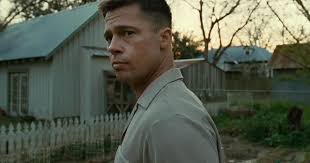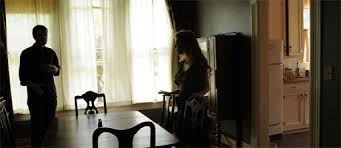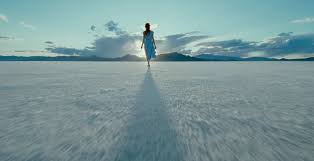Entre o cósmico e o momentâneo:
«Árvore da Vida», de Terrence Malick

Jack (Sean Penn) é uma alma perdida. Rodeado e imerso pelas muralhas da sua própria existência, fortalezas distorcidas, de vidro brilhante e betão oblíquo, recorda agora o seu passado: sua infância, seus irmãos e suas brincadeiras, seus pais e seus ensinamentos. Fá-lo recebendo em si a genuína humanidade que Malick trabalha nos seus anteriores filmes. Fá-lo procurando ser o arquétipo do Homem, na sua ora perturbadora ora graciosa pequenez, na sua angústia e temor na busca pela razão de tudo, na sua força consigo mesmo e na sua fragilidade contra a natureza, no seu desconfiado mas emocionado receber das mais ténues e das mais meteóricas coisas, na sua determinada e sortuda, mas hesitante e desgraçada vontade de ser e estar em todos os dias de uma vida. A ideia que fica não é a de que Terrence coloca questões, mas sim de que as pinta e toca. Este é o seu filme mais livre, de caminhada mais improvisada e sincera, ao sabor da luz natural do sol, a única que, com o director de fotografia Emmanuel Lubetzki («O Novo Mundo», «Os Filhos do Homem»), admitiu para plantar esta Árvore. Um protesto contra a fragmentação do filme parece-me injusto, pois o que alicerça o trabalho deste argumento e desta câmara em grande-angular é o conjunto de grandes momentos, como Stanley Kubrick em tempos defendeu que devia ser feito um filme.

Quando voltamos até 1950, para junto da família O’Brien, Jack apenas procura a reconciliação com o seu pai (Brad Pitt), homem duro e conservador, mas íntegro e apaixonado, cujo tratamento moldou o seu crescimento e afirmação na idade que lhe foi sendo acrescentada. Mas tudo não passa de um ainda mais profundo ímpeto de solidão espiritual, de uma capa para um desejo íntimo e corrosivo de encontrar propósito para toda a sua vida. Assim, mergulha e busca, naqueles longínquos tempos, um raio de inocência, um esgar de comoção, uma pegada de deslumbramento que outrora tenha dado, que abale ou reconforte o desapego, o desgosto, o desencanto que hoje sente. É aqui que caímos. Caímos e vamos caindo, numa espiral sem paredes e sem fundo, feita de mosaicos coloridos, de dançantes recortes rochosos, de voluptuosas, borbulhantes e refrescantes ondas do mar, de cataratas espumantes e diluviais, de campos de girassóis, de árvores deificadas. Quando vimos à tona e respiramos ofegantes, já entrámos na história da família de Jack. Pai e mãe (Jessica Chastain) ainda se deitam na relva, sob a comovente paixão dos primeiros tempos, banhados por intermitências de luz que homenageiam o mistério do toque, do abraço, da concepção. Creia-se ou não que a planificação foi substituída pelo mero captar, nunca deixaremos escapar deliciosos detalhes como a mãe que pega o filho ao colo e o afasta da sofredora imagem de um homem em ataque epiléptico.

Antes de assistirmos ao desenrolar de uma das mais belas relações “pai-filho” que o cinema já conheceu, estamos presos numa escala de “porquês” e vamos até ao início dos tempos para questionar o propósito de toda a existência. Estudou o cosmos por material da NASA e, sob uma filosofia de montagem simbólica e metafórica que cobre toda a película, criou sequências acima da esfera espácio-temporal e ensaiou sobre o biológico e o astronómico: feixes e explosões de cores e formas, estrelas e meteoritos, gases e lava, líquido e rocha, nébula e peixe, paisagem e dinossauro, microscópico protozoário e magnânima aurora planetária de inspiração em «2001 » , ao som da excruciante e gloriosa «Lacrimosa» de «Requiem for a Friend», de Zbigniew Preisner.

A segunda metade de «Árvore da Vida» estabiliza narrativamente, mas nunca foge ao que já foi. O estilo continua a fugir à convenção, nas cores, na composição e nos enquadramentos, a favor de movimentos improvisados de câmara e actores, intensificando o impacto do tom e atmosfera naturalísticos e etéreos que vêm gerando uma legião de fãs malickianos desde «Noivos Sangrentos», em 1973. Tudo flui como um rio, vivo e com vida para dar, precisamente aquilo que o realizador pediu a Alexandre Desplat, no construir da banda-musical. A mãe de Jack representa a sua lembrança do sorriso, do carinho, da protecção, do consolo, da adorável tarefa de ser criança para sempre, enquanto que o pai é o mordomo da tenacidade, do respeito, da disciplina, e da árdua tarefa de ter de entrar no mundo adulto.
Mas Malick nunca nega a profunda compaixão de ambos. Correndo, correndo, e admitiria que aqui se alonga um pouco, seguimos os troços de educação que Jack e os seus dois irmãos percorreram, no ingrato despontar de uma visão necessariamente cada vez mais frontal do mundo.

No final, a rebeldia de uma criança que temia o pai e que jurava que este o queria morto brutaliza-se na face do presente, e é apenas aqui que o êxtase do realizador, quase surrealista, causa alguma confusão ao público e dá algum material às reacções negativas. É principalmente neste ponto que ferve a dificuldade de interpretação, em pleno clímax. A mim, parece-me que Jack sucumbe à fé. E dizer isto é abrir novo espaço para as vozes mais cépticas, que encontram na constante voz-off um dispositivo demasiado explicativo, e literário, de pretensiosismo poético. Mas não será mero complemento à imagem? Porque se sente efectivamente uma religiosidade que não é pregada mas sim orada como um suspiro e desabafo pessoais de Terrence Malick. Jack sucumbe, acima de tudo, à fé no prazer da simplicidade de uma erva, de um raio de luz, das pequenas coisas que a natureza comporta (como o pequeno pássaro ferido, agoniante imagem de «A Barreira Invisível»), do falar, do relacionar, do dar a mão. Do abraço, aliás. O abraço, aquele que o pequeno Jack não aguenta em não dar ao homem com quem travava tanta familiaridade e tanto conflito, que se traduzirá no perdão final para o pai que o tornou igual a si, numa praia de libertação como nos «400 Golpes», de Truffaut. As respostas continuam no ar mas Malick propõe a sua versão de verdade (quer acreditemos numa ou não): a alegria de tudo, dos primeiros passos à mão idosa e enrugada; a graça da existência na inatingível relação entre o cósmico e o momentâneo, entre o grande-quadro e a pequena intimidade. Enfim, nas pequenas coisas e na beleza da sua imperfeição.

 After several twitter rumors, Variety confirms the absence of the last weeks' word-to-mouth built Django, Will Smith, and confirms the star: Jamie Foxx.
After several twitter rumors, Variety confirms the absence of the last weeks' word-to-mouth built Django, Will Smith, and confirms the star: Jamie Foxx.

